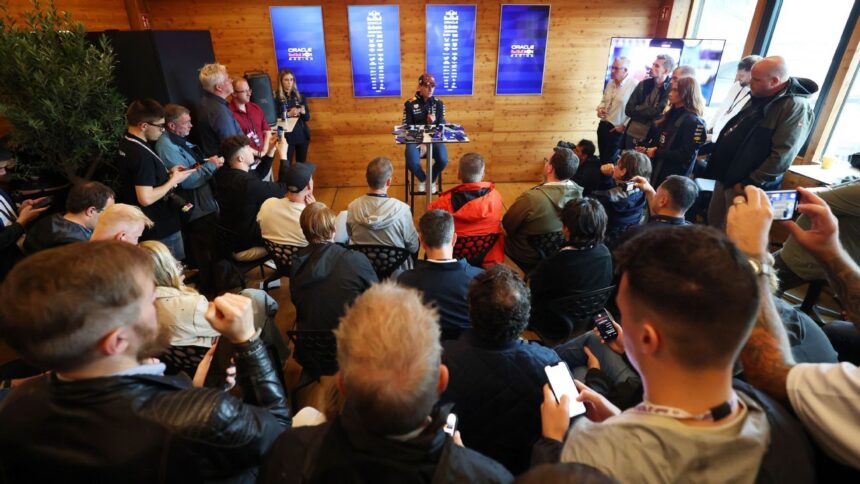Red Bull at the Crossroads: Horner’s Departure and the New Chapter at Spa-Francorchamps
The Belgian Grand Prix has marked a turning point for Red Bull. For the first time since its debut in 2005, Christian Horner was not present in the paddock, plunging the team into an atmosphere of uncertainty. Horner’s dismissal, announced a few days after the British Grand Prix, took many by surprise, although internal tensions and political conflicts had been increasing in recent months. The news has dominated the sporting landscape ever since. Max Verstappen, in a crowded briefing on Thursday, and the new team principal, Laurent Mekies, who addressed the media on Friday, are the main faces of the team.However, the silence from the higher echelons, above Verstappen and Mekies, has been notable. Oliver Mintzlaff, an Austrian executive and head of Red Bull’s sports divisions, was a key figure in Horner’s departure. Although his presence was expected in Spa-Francorchamps on Friday, he has been reluctant to offer explanations about the decision.

Why was Horner fired?
Despite the considerable media attention surrounding Horner’s departure, Red Bull’s parent company has yet to reveal the official reasons for the decision. Speculations are diverse: rumors about Verstappen’s possible departure, the growing political tension between Horner and Helmut Marko, advisor to Red Bull Racing, the persistent animosity between Horner and Jos Verstappen, Red Bull’s irregular results on the track, or the loss of key figures in recent years. A combination of these factors could be the cause. The pressure is on Red Bull GmbH to provide a solid explanation for Horner’s departure. Sources close to the team have expressed their surprise and discontent at the lack of clarity in the decision. Horner, although often perceived as a villain by the public, was popular among most of the team, especially among those based at the factory. He led the team from its foundation, overseeing every victory and championship. The lack of explanations, especially after two decades of leadership, has generated unease. Verstappen’s comments on Thursday were notable. The four-time world champion claimed to have expressed his opinions to the “shareholders”, but these would remain private. It is known that Chalerm Yoovidhya, the main shareholder of Red Bull GmbH, flew to Monaco to personally inform Verstappen of the decision. Yoovidhya had been a staunch supporter of Horner, but his stance changed, possibly due to the combination of factors mentioned and the increasing pressure from the Austrian side of the company to remove him. Jos Verstappen and Marko seem to have been the most influential voices, who felt frustrated by Horner’s power in recent years.Sources close to the team suggest that no official statements or clarifications are expected regarding the events that led to Horner’s departure. This stance is curious, considering Horner’s importance to Red Bull Racing.

Is Mekies a long-term solution?
Laurent Mekies, new team director and CEO of Red Bull, has taken on both roles left by Horner, suggesting a wide initial margin for maneuver. However, the reality could be different. Mekies is highly valued, both internally and externally. His career includes praise from Carlos Sainz. Mekies, who was Mattia Binotto’s deputy team principal at Ferrari before leading Red Bull’s junior team, has risen rapidly through the ranks. The contrast between Mekies’ and Horner’s backgrounds is notable. Horner came from a failed career as a driver, while Mekies has an engineering background and trained at the Minardi team, acquired by Red Bull. His appointment could change the perception of Red Bull’s challenges in finding an effective teammate for Verstappen. Outside of decisions related to the drivers, Mekies’ immediate task will be to improve Red Bull’s performance on the track. Speculation about Verstappen’s move to Mercedes in 2026 seems exaggerated. The development of the new engine for next year could influence the driver’s decision more than any action by Mekies. One of Horner’s strengths was delegating. Mekies, with his technical experience, could influence the technical department of Red Bull Racing. In addition, Mekies is expected to focus on the commercial side of the business. Horner was a shrewd negotiator, capable of attracting key sponsors. Red Bull Racing is expected to appoint a CEO to focus on the commercial aspect.How will Red Bull be post-Horner?The conversation between Mintzlaff and Horner has been brewing for a while. Marko, Mintzlaff, and Mark Mateschitz were frustrated by the loss of the original identity of Red Bull Racing: a team willing to do things differently and have fun off the track, while beating their rivals. Sources close to both teams agree: the junior team is perceived as a more pleasant workplace, while the main team, despite its success, has been transformed into a corporate machine with few differences from its rivals. It remains to be seen how much Red Bull Racing can change towards that mentality. Fans and the media can expect less controversy from Mekies, but the fundamental question about the DNA of the Red Bull Racing team remains unanswered. Time will tell.









